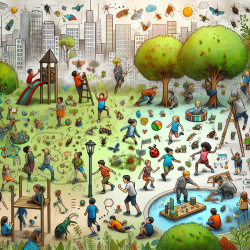In today's fast-paced digital world, children are spending less time outdoors and more time glued to screens. However, a recent study titled "More than a Pretty Place: Assessing the Impact of Environmental Education on Children’s Knowledge and Attitudes about Outdoor Play in Nature" reveals the transformative power of environmental education in encouraging children to embrace outdoor play. This blog delves into the key findings of the study and offers practical tips for practitioners looking to enhance their skills by incorporating these insights into their practice.
The Benefits of Outdoor Play
Physical activity is crucial for children's development, offering numerous benefits such as improved physical health, mental well-being, and social skills. The study highlights that engaging in outdoor play in natural settings amplifies these benefits. Children exposed to nature while playing experience reduced stress levels, improved mood, and enhanced cognitive functioning.
Moreover, outdoor play fosters creativity and problem-solving skills as children navigate natural environments. It also encourages social interaction and cooperation as they engage in group activities or games.
Breaking Down Barriers to Outdoor Play
Despite its numerous benefits, several barriers prevent children from engaging in outdoor play, especially in urban settings. These include:
- Lack of Access: Urban areas often lack green spaces, making it challenging for children to find safe places to play.
- Parental Concerns: Safety concerns about traffic, strangers, and potential injuries can deter parents from allowing their children to play outside.
- Cultural Barriers: In some communities, there may be cultural norms or beliefs that discourage outdoor play.
The study found that environmental education programs can effectively address these barriers by educating both children and parents about the benefits of outdoor play and providing safe spaces for such activities.
The Role of Environmental Education
The "More than a Pretty Place" study conducted a quasi-experimental design involving six schools near the Urban Ecology Center in Milwaukee. The intervention group participated in environmental education programs that included hands-on science activities aligned with state standards. These programs were designed to increase children's knowledge of local natural areas and reduce fears associated with outdoor play.
The results were promising: students in the intervention group reported reduced fears of playing outdoors and increased visits to the Urban Ecology Center. Additionally, there was a significant increase in the number of students who knew a place where they could play outside in nature.
Practical Tips for Practitioners
If you're a practitioner looking to implement these findings into your work, consider the following tips:
- Incorporate Nature-Based Activities: Design programs that integrate nature-based learning experiences. This could include field trips to local parks or nature reserves or incorporating nature-themed projects into your curriculum.
- Engage Parents: Educate parents about the benefits of outdoor play and address any safety concerns they may have. Encourage them to participate in nature-based activities with their children.
- Create Safe Spaces: Work with local communities to identify or create safe green spaces where children can engage in outdoor play without fear.
- Foster Partnerships: Collaborate with local environmental organizations or community groups to provide resources and support for your programs.
The Path Forward
The findings from this study underscore the importance of environmental education in promoting outdoor play among children. By addressing fears and increasing access to natural spaces, we can help foster a generation that values and engages with the natural world. As practitioners, it's crucial to continue exploring innovative ways to connect children with nature and advocate for policies that support this goal.
If you're interested in diving deeper into this research, I encourage you to read the original research paper: More than a Pretty Place: Assessing the Impact of Environmental Education on Children’s Knowledge and Attitudes about Outdoor Play in Nature.










